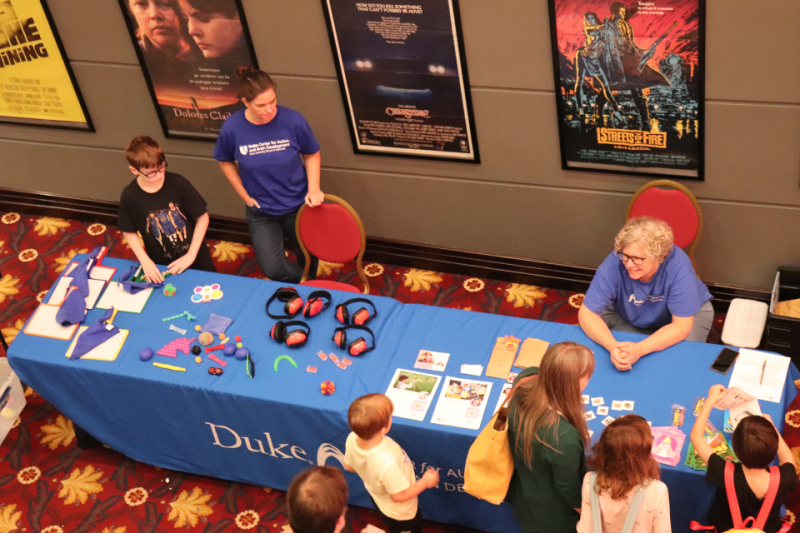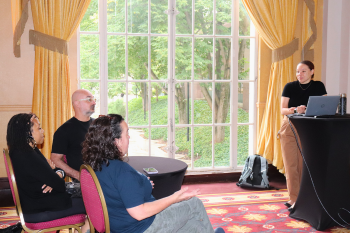
On a warm, sunny Saturday morning just a few days before Halloween, dozens of children, teens, and adults made their way to Durham’s historic Carolina Theatre to watch a free showing of the classic seasonal comedy, “Hocus Pocus.”
Many of them came with snacks from home and headed from the theater’s box office to a table filled with “fidgets,” toys, coloring pads, and other items they could borrow to enhance their moviegoing experience. As showtime approached, they settled into a dimly lit theater with sound levels lowered and plenty of space to move around during the movie.
It was the fourth film in the 2024-2025 Sensory Friendly Film Series, an initiative created through a partnership between the Carolina Theatre of Durham and the Duke Center for Autism and Brain Development. The monthly series provides a safe and welcoming cinema experience for autistic individuals and others in need of sensory accommodations.
A Vision Comes to Fruition
The series was the brainchild of Dana Livermore, the theater’s former community collaboration and program specialist. She approached Lori Reinhart-Mercer, RN, a clinical research nurse coordinator and recruitment and outreach coordinator at the Duke Center for Autism and Brain Development, with her idea in the fall of 2022.
With great enthusiasm, Reinhart-Mercer quickly assembled a small team of staff members to help launch the series. Today, she and Jordan Grapel, a research interventionist at the center, lead the effort along with Shana Adams, the senior director of education and community engagement at the theater. An advisory board at the theater helps select movies and contributes ideas to enhance the series. Reinhart-Mercer and Grapel, who is autistic, serve on the board, along with an autistic teenager and people from Arts Access NC, Autism Society of North Carolina, Autismazing, and other organizations.
The pilot series began with the animated film “Inside Out,” in July 2023. With attendance averaging around 60 monthly moviegoers throughout the 2023-2024 season, and one film—“Moana”—attracting more than 100 attendees, the team decided to launch a second season, starting with “Trolls” in August 2024.

Adams picked up where Livermore left off, and the theater staff has embraced the series. “There aren’t a lot of places where families, children, teens, and adults with sensory sensitivities can go to enjoy films,” Adams reflected. “It’s nice to have a place in your community where you can go and feel comfortable and where the staff is trained, in a theater that really cares about making things accessible.”
To help ensure a positive experience for moviegoers, Duke Center for Autism and Brain Development staff have hosted periodic educational sessions to teach theater staff about autism and provide guidance on engaging with autistic people. In addition, at least one staff member from the center is available onsite during the sensory-friendly movie showings.
Not Your Typical Movie Experience
Many children with autism and other sensory sensitivities find it difficult to fully enjoy conventional movie theater experiences, notes Reinhart-Mercer. They often struggle with loud sounds, the stark contrast of the bright screen and pitch-black lighting, the crammed feel of a cinema filled to capacity, and the expectation to be still and quiet throughout the movie. In addition, typical concessions may not align with their food preferences and dietary restrictions.
The Sensory Friendly Film Series aims to remove these barriers, providing an inclusive and comfortable experience for these children and their families. In addition to the lower-contrast lighting and decreased volume, tickets are capped at about 70 percent capacity, allowing children to feel less confined and free to move their bodies. Talking, making noise, walking around, dancing, and sitting on the floor are all acceptable activities.
“Some young kids, especially young autistic kids, can be very fidgety and have a lot of energy and want to move around,” said Grapel, a film aficionado who attends nearly every movie in the series. “We've had lots of occasions where the movie’s been playing and there are kids playing with toys on the stairs or running around, and it’s completely accepted, and the kids love it.”
If a child needs a break from the movie, they can go to an empty adjacent theater designated as a quiet space, where they can relax.
Attendees can also bring their own snacks and drinks or purchase them at the concession stand; a visual menu is provided for non-verbal individuals. Booster seats, earplugs, and audio descriptions or closed captioning devices are also available.
Positive Vibes All Around
The series has been a hit with local families, with repeat moviegoers and new faces at each screening and an overwhelmingly positive response both anecdotally and on feedback surveys.
“The Sensory Friendly Film Series at the Carolina Theatre rolls out the red carpet for all of us,” parent Katharine Markevich shared. “I can’t express how much I appreciate having a free event where my kids can experience total acceptance of their various needs. We can relax knowing that both the employees and those who have chosen to attend all have the same expectations. In every detail, these events are put together thoughtfully and with intention, and we are grateful to have access to them.”
Grapel finds great reward in witnessing the joy he sees in the attendees. “My favorite thing about it is before the movie starts, when all the families come in and you’ve got different kids coming up to our sensory table and looking at toys and seeing what they want and getting really excited. It’s just fun seeing the kids so happy and excited to be out and doing stuff, and you see parents happy too.”
On a more personal note, he adds, “I just love movies, and I love being able to merge my personal love of movies with my work passion of making life better for people with autism.”
For Reinhart-Mercer, connecting with community members and sharing information with them, while fostering new relationships, keeps her excited about the partnership. She also enjoys giving staff members from the center—especially junior staff members—opportunities to engage in the community and take on important roles in the film series. “It’s very enjoyable to watch them grow and kind of light up about their experiences and let them get the recognition,” she reflected. “It does take a team—it’s not one person by any means.”
On the Horizon
In hopes of building on the success of the film series, Reinhart-Mercer and Adams are starting to explore the possibility of offering sensory-friendly live performances in the future. Adams notes, though, that they want to “do it right,” consulting with staff from other arts organizations that have offered similar programming and seeking input from families who have attended the Sensory Friendly Film Series.
The 2024-2025 Sensory Friendly Film Series will extend through May 2025 on select Saturday mornings. Learn more about the series and upcoming films (the spring movie lineup will be announced soon!)
Want to be among the first to know about the series schedule and other sensory-friendly community events? Sign up for the center’s bimonthly newsletter!
The Sensory Friendly Film Series is sponsored by the Duke Center for Autism and Brain Development, Duke Energy, the Mary Duke Biddle Foundation, the North Carolina Arts Council, the National Endowment for the Arts, and Phoenix Wealth Advisors.
The Duke Center for Autism and Brain Development is part of Duke’s Department of Psychiatry & Behavioral Sciences.